THE GRAY-HAIRED BUSMAN removes their soup bowls, and two waiters arrive. One delivers their salads and operates an enormous pepper grinder over them. The other places a small casket beside each plate. They bow and scrape away.
“What’s that?” asks Leila.
“It looks like a coffin,” says Matthew.
“You’re sure you knew what you were ordering?”
“Gee, I thought so. ‘Grilled Lilliputian.’ I thought that was — ”
She giggles. She got it. She got it.
“All right,” she says. “I’m taking a look.” Slowly she raises the lid of the casket. Inside, reposing on velvet, is a salad fork. She removes it. “It’s cold,” she says.
“Oh, boy,” says Matthew. “Chilled salad forks.” He’s about to add something acerb, but Leila says, “They really know what they’re doing, I guess, huh?” and he just smiles and nods.
THEY EAT their salads, then their entrees are served, and they eat in silence for a while. Then, suddenly, as if an idea has just occurred to her, turning on the banquette, so that Matthew has a passing worry that she may jar the table and spill everything, she says, “Matthew?”
“Yes?”
“Could we go out after dinner?”
“Sure. Where would you like to go?”
“Could we go dancing?”
Matthew likes to think of himself as a pretty good dancer, but he knows he’s not. He never learned to dance when he should have, in high school. He was barely able to get up the nerve to dance at all then, and he was terrified of the fast dances. He knew all the words to rock ’n’ roll songs, but he couldn’t carry a tune or tap his feet in rhythm. At a dance he was tapping a paper cup in what he thought was time to the music, when a girl sitting next to him, a wallflower like him, said, “Will you stop it? You’re not even on the beat, you know,” and he never risked dancing again. He began listening to old pop music of the thirties and forties, that led him to jazz of the same era, and that’s how he discovered the saxophonists with the big sound, Ben Webster, Coleman Hawkins, Chu Berry. In college he discovered that drinking made him a better dancer — not good, exactly, but good enough so that he dared to dance. For a few years he enjoyed it, but he never progressed. He had a couple of steps that he could do, and he did the same steps, at different tempos, across a decade of shifting fashion in rock music. Then, presto, he felt too old for rock ’n’ roll. Liz loved to dance, and every now and then she would get a group together to try one new club or another. Inevitably, on these outings, Matthew would catch sight of himself and his friends in a mirror, surrounded by the kids who were the other patrons, and see a bunch of aging men and women who should, it seemed to him, have stayed home. Matthew hopes that Leila doesn’t want him to take her someplace where he’ll feel like a chaperone at a high school dance.
“Where would you like to go?” he asks.
“I don’t know. Someplace grown up. Like an old movie? You know, ‘out together dancing cheek to cheek’?”
Am I in the middle of some kind of miracle? Am I awake? “Heaven, I’m in heaven — ”
“Of course we can,” he says. “I know a couple of places. I haven’t been to any of them, but you know what we can do? We can try them all.”
“Great.”
“How are you enjoying the Züri Gschnätzlets?”
“Is that this? God, I love it. Is yours good?”
“Well-l-l.” He shrugs. “It’s a little overdone. I don’t mean overcooked. It’s got too much of everything. The sauce is too rich. Too much cream. Too much seasoning. I think they used dried herbs, and to make up for the loss of flavor they threw them in by the handful. And then they used too much flour to thicken the whole thing. So — ”
“Oh.” She pokes her fork into the food on her plate. “I wonder if this is any good. Or am I just too dumb to notice?”
“Cut it out.”
“Here. Try some.”
She forks a bite from her plate. The champagne must be getting to her a bit: this is far too big a bite. She laughs at the sight of it, holds it over her plate, letting some of the sauce drip off, bounces it a couple of times. “Open up,” she says. She swings the fork toward Matthew, and the whole gooey load falls into his lap. It misses his napkin, placed as he habitually places it, uselessly over his left leg, and lands on his crotch.
Very softly she says, “Oh, shit.”
The fastidious Matthew is mortified. He doesn’t say so to Leila, but the fear that rushes immediately to mind is that people, seeing the stain, will think he has wet his pants, as he used to when he was a boy, and the second fear, which quickly supplants the first, is that they will think he has ejaculated, an aging lecher who couldn’t contain himself in the overstimulating presence of his young victim. He scoops the food up with his hand and pulls his napkin over the spot.
[to be continued]
In Topical Guide 513, Mark Dorset considers Words: Misnomers; Music: Jazz; Music: Lyrics; and Food: Swiss: Züri Gschnätzlets from this episode.
Have you missed an episode or two or several?
You can begin reading at the beginning or you can catch up by visiting the archive or consulting the index to the Topical Guide.
You can listen to the episodes on the Personal History podcast. Begin at the beginning or scroll through the episodes to find what you’ve missed.
You can listen to “My Mother Takes a Tumble” and “Do Clams Bite?” complete and uninterrupted as audiobooks through YouTube.
You can ensure that you never miss a future issue by getting a free subscription. (You can help support the work by choosing a paid subscription instead.)
At Apple Books you can download free eBooks of Little Follies and Herb ’n’ Lorna.
You’ll find overviews of the entire work in An Introduction to The Personal History, Adventures, Experiences & Observations of Peter Leroy (a pdf document) and at Encyclopedia.com.

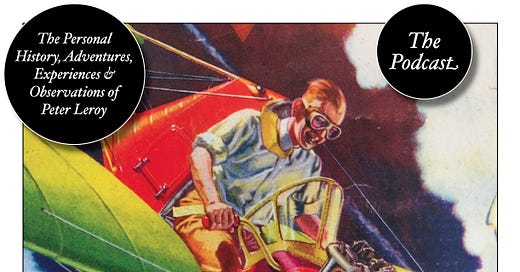





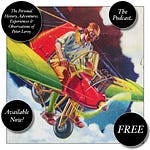



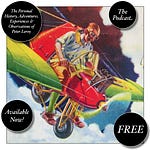
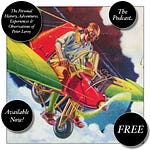
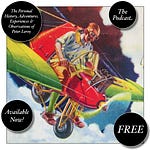
Share this post